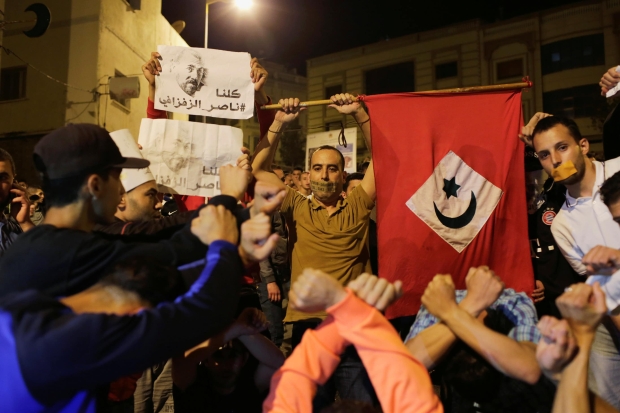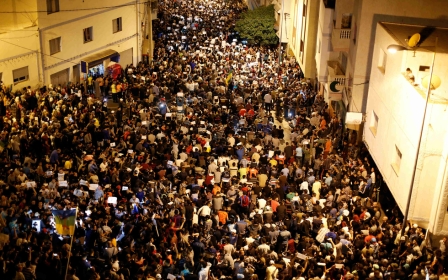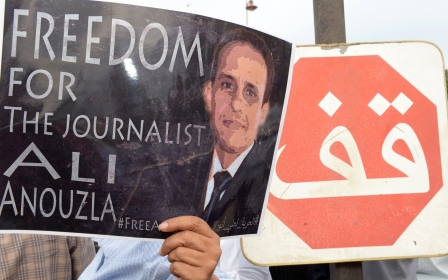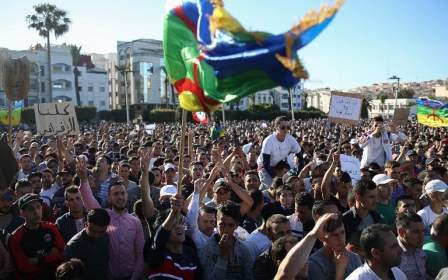Thousands rally in Morocco for release of Zefzafi and ending corruption

Thousands of young people clashed with riot police in northern Morocco on Friday night, following a general strike called for by activists demanding the release of a protest leader.
Nasser Zefzafi, who emerged as the head of the grassroots al-Hirak al-Shaabi, or "Popular Movement," was arrested on Monday after three days on the run.
His arrest sparked protests in the neglected Rif region of northern Morocco, where demonstrators have been demanding more development and railing against corruption, repression and unemployment.
Demonstrators on the streets of Imzouren threw stones at officers, who in turn used water cannon and charged the protesters in a bid to disperse them and bring down their improvised barricades.
Political unrest is rare in the North African kingdom, but protests around the northern town of Al-Hoceima have been simmering since October after a fishmonger was crushed inside a garbage truck while trying to salvage his fish that had been confiscated by police.
Chanting "the people demand prisoners be freed" and "we are all Zefzafi," several thousand people gathered in Al-Hoceima's Sidi Abed square late on Friday night.
Some protesters put tape on their mouths and tied their hands to symbolise arrests.
"Nasser defended his rights, he defended our rights, he's our hero. He did nothing to deserve arrest," said Zahya al-Hassani, a mother of four.
'The doors to dialogue remain open with civil society'
-Mustafa El-Khafli, government spokesman
It was not immediately possible to confirm if any demonstrators or police had been injured in the clashes. The protest broke up around midnight.
Zefzafi was detained along with others on Monday for "attacking internal security" after a warrant for his arrest issued a week ago sparked turmoil in Al-Hoceima, a city of 56,000 inhabitants.
He is also accused of having interrupted the sermon of an imam in the main mosque of the city, accusing him of inciting the congregation against the protest movement.
Government spokesman Mustafa El-Khafli said authorities have detained around 40 people since last Friday, 31 of whom are still under arrest, the official MAP news agency reported.
Core members of al-Hirak were among those arrested.
"The doors to dialogue remain open with civil society," El-Khafli was quoted as saying by MAP.
History of dissent
Most shops in Al-Hoceima were shuttered for the second day of a three-day general strike called by Al-Hirak.
Many carried flags representing the Rif region, which has a history of dissent and once declared brief independence under a local Berber leader in the 1920s during the war with colonial Spanish forces.
Authorities placed a heavy police presence around the town and the square, where protesters said they had prevented a larger crowd from forming. Hours earlier in nearby Imzouren, police fired water cannon to disperse hundreds of protesters who clashed with security forces, tossing rocks and rubble.
Fishmonger Mouhcine Fikri's death has become a symbol for frustrations about official abuses and revived the spirit of the February 20 movement that led pro-democracy rallies in 2011 and prompted King Mohammed VI to cede some of his powers.
"We never imagined Fikri's death would reach this point. The people are angry," said Suleiman Ben Kadder, who said he knew the fishmonger at the port where he worked.
While some anger in the Al-Hoceima protests has been directed at "Makhzen," the royal governing establishment, the unrest in northern Morocco, as in 2011, has not been aimed at the king. Morocco has a deeply rooted monarchy, the Muslim world's longest-serving dynasty.
But the unrest around Al-Hoceima and the Rif region is testing nerves in a kingdom that presents itself as a model for stability and steady reform as well as a safe haven for foreign investment in a region widely torn by militant violence.
New MEE newsletter: Jerusalem Dispatch
Sign up to get the latest insights and analysis on Israel-Palestine, alongside Turkey Unpacked and other MEE newsletters
Middle East Eye delivers independent and unrivalled coverage and analysis of the Middle East, North Africa and beyond. To learn more about republishing this content and the associated fees, please fill out this form. More about MEE can be found here.





